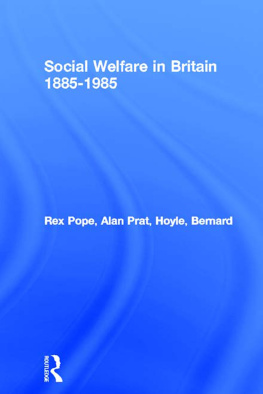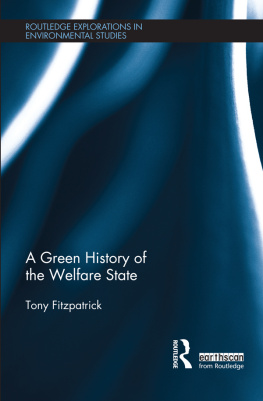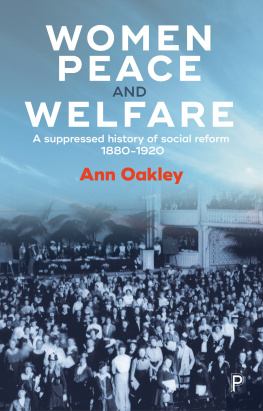SOCIAL WELFARE IN BRITAIN 18851985
SOCIAL
WELFARE IN
BRITAIN
18851985
Edited by
REX POPE, ALAN PRATT AND BERNARD HOYLE

CROOM HELM
London Sydney Dover, New Hampshire
Selection and editorial matter 1986 Rex Pope, Alan Pratt and Bernard Hoyle
Croom Helm Ltd, Provident House, Burrell Row,
Beckenham, Kent BR3 1AT
Croom Helm Australia Pty Ltd, Suite 4, 6th Floor, 6476 Kippax Street, Surry Hills,
NSW 2010, Australia
British Library Cataloguing in Publication Data
Social welfare in Britain 18851985
1. Great BritainSocial Policy
I. Pope, Rex II. Pratta, Alan III. Hoyle, Bernard
361.610941 HN390
ISBN 0-203-48045-7 Master e-book ISBN
ISBN 0-203-78869-9 (Adobe eReader Format)
ISBN 0-7099-4001-7 (Print Edition)
ISBN 0-7099-4035-1 Pbk
Croom Helm Ltd, 51 Washington Street,
Dover, New Hampshire, 03820 USA
Library of Congress Cataloging in Publication Data
Main entry under title:
Social welfare in Britain, 18851985.
Bibliography: p.
Includes index.
1. Social serviceGreat BritainHistory19th century. 2. Social
serviceGreat BritainHistory20th century. 3. Great BritainSocial policy. 4. Great BritainEconomic conditions19th century. 5.
Great BritainEconomic conditions20th century. I. Pope, Rex. II. Pratt, Alan. III. Hoyle, Bernard. HN385.S66 1986 361.941 8528046
ISBN 0-7099-4001-7
ISBN 0-7099-4035-1 (pbk.)
CONTENTS
PREFACE
The increased use of primary source materials is a marked characteristic of recent trends in the study of subjects such as History, Politics or Social Policy and Administration. This book is intended to add significantly to the stock of readily-available material of this type. It is unique in its timespan, not only covering the conventional era of developments in welfare thinking and provision from the late-nineteenth to the mid-twentieth century, but also including the recent past with its quest for redefinitions or a new approach.
The primary sources have been presented in two sections, covering the periods 1885c.1940 and c.1940 to 1985. During the former, ideas on, and the scope of, welfare provision broadened greatly. There was a sense of progress. Developments, though, were piecemeal; there was no concept of a Welfare State. The second period begins with he changes of the 1940s and the widespread assumption that Britain was establishing a Welfare State. Subsequently, however, there has been mounting speculation as to whether such organisation of society is necessary or desirable and it has been apparent that the hopes of the 1940s have not been fulfilled.
In both these sections, extracts have been grouped under headings. This grouping seemed preferable to a simple chronological organisation. The emphasis throughout is on issues, influences and ideas. This is presented as an alternative or complement to the service-orientated approach of some other documentary collections. aims at providing useful background information in graph or chart form.
The target group for the volume in primarily students on A-level, first degree and professional training courses. This consideration has influenced the price and hence the size of the book. This, in turn, has meant the omission of much that is both interesting and important. What is most interesting and most important does, we hope, remain.
Rex Pope
Alan Pratt
Bernard Hoyle
ACKNOWLEDGEMENTS
The editors are extremely grateful to the copyright-holders who have kindly allowed their material to be reproduced in this book. In particular, acknowledgement is due in the cases listed below. If the editors have inadvertently included copyright material without making due acknowledgement, they offer their sincere apologies.
George Allen and Unwin Publishers Ltd (B21, B24); Basil Blackwell Publishers Ltd (B29); Bell and Hyman Ltd (B25); Chapman and Hall Ltd (A1); The Conservative and Unionist Central Office (B12); The Conservative Political Centre (B13, B16, B17, B30); The Estate of C.A.R.Crosland (B20); The Fabian Society (A24, B36); Gower Publishing Company Ltd (B23, B26); Victor Gollancz Ltd (B6); The Controller of Her Majesty's Stationery Office (A4, A6, A7, A8, A9, A10, A11, A12, A14, A15, A16, A18, A19, A20, A21, A22, A23, A27, A31, B2, B3, B4, B5, B7, B8, B9, B10, B11, B28, B37); The Institute of Economic Affairs, London (B22); The Labour Party (A26, A34, A35, B14, B15); Lawrence and Wishart Ltd (B34); Longman Group Ltd (A25, A32, A33); Macmillan Publishers Ltd (A3, B31); Methuen and Company Ltd (A2); John Murray Publishers Ltd (B32); The National Council for Voluntary Organisations (A5, A17); Penguin Books Ltd (B27); The Political Quarterly (B18, B19); Pluto Press Ltd (B35); Routledge and Kegan Paul PLC (B1); The Joseph Rowntree Charitable Trust (A29, A30); Salvationist Publishing and Supplies Ltd (A28); The Social Affairs Unit (B33); University of California Press (B27).
SOCIAL WELFARE IN BRITAIN 18851985
SECTION A: 18851940
Introduction
In the 1880s, social policy was still largely restricted to the deterrent Poor Law. The twin ideologies of self-help and laissez-faire dominated welfare thinking. Outside the Poor Law, only in relation to schools and factories had there been effective legislation. Even in these areas, coverage was restricted: to women and children in the factories and to elementary education for the working classes in the case of schooling. At the other extreme was housing where the ideology of the market economy, coupled with belief in the rights of property holders, was to delay any real advance until after the First World War.
Nevertheless, the pressures for action were mounting. Moral and physical degeneracy were seen as linked consequences of the deprivation of the urban poor. Statistical evidence of poverty and analyses of its causes indicated that the personal failing explanation of poverty was insufficient, as was charity as a remedy. Increasing longevity threatened to destroy the financial stability of the friendly societies and to overwhelm the Boards of Guardians. Unemployment and under-employment were found to be problems as much of the labour market as of individuals. Concern for public order motivated the state's early initiatives towards alleviating the conditions of the unemployed. A quest for economic efficiency motivated those who sought to attack the problem at its rootto prevent unemployment.
The administrative and military needs of empire combined with a growing awareness of economic competition as further stimulants to action. So, too, did the example set by Germany, ostensibly Britain's major rival. The need to combat the appeal of labourism or socialism (and, in the case of the Liberals, to fight tariff reform) were further influences.
As a result, the early twentieth century saw increased state intervention in social welfare. Local authorities were permitted to use the rates to support secondary education (1902), to adopt measures such as labour exchanges, farm colonies or emigration to relieve unemployment (1905) and to provide free or subsidised school meals (1906). Compulsion was used with regard to the establishment of Distress Committees (1905), the introduction of school medical inspection (1907) and membership of the Health and Unemployment Insurance schemes (1911). The commitment to income maintenance outside the Poor Law, represented in the 1911 Acts, could also be seen in the provision of Old Age Pensions (1908). The quest for labour market efficiency was a factor in the unemployment insurance section of the 1911 scheme and in the establishment, from 1910, of a national system of labour exchanges. Additional measures, catering for particular groups, included the greater provision of free places in secondary education (1907), together with the protection of children (1908) and of the low paid (1909).










